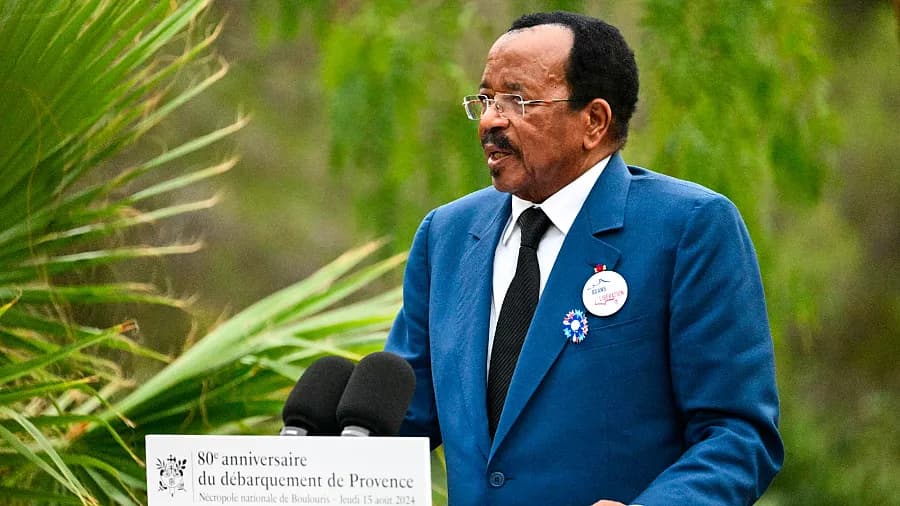We're loading the full news article for you. This includes the article content, images, author information, and related articles.
Cameroon's Constitutional Council has dismissed all petitions challenging the October 12 presidential election, clearing the path for President Paul Biya to extend his 42-year rule amidst widespread opposition protests and allegations of electoral fraud.

Cameroon's Constitutional Council on Wednesday, October 22, 2025, dismissed all petitions contesting the presidential election held on Saturday, October 12, 2025. This decision paves the way for the official announcement of results, which are widely expected to confirm 92-year-old President Paul Biya's victory for an eighth term. The council is mandated to proclaim the final results by Monday, October 27, 2025.
The dismissal of the petitions has intensified political tensions across Cameroon, leading to clashes between security forces and opposition supporters in various cities, including the capital Yaoundé, Douala, and Garoua. Protesters accuse authorities of widespread electoral fraud and manipulation. In response, security forces have deployed tear gas and made arrests.
At least 20 people have been arrested in connection with these protests, with authorities confirming detentions in Garoua. Cameroon's Minister of Territorial Administration, Paul Atanga Nji, stated on Tuesday, October 21, 2025, that 20 of those arrested would face military courts on charges of insurrection and incitement to rebellion. He accused the protesters of being manipulated by political actors aiming to destabilise the country.
Opposition candidate Issa Tchiroma Bakary, a former government minister, declared himself the winner of the October 12 election just a day after the vote. He urged President Biya to concede defeat, claiming the people had made their choice and it must be respected. Tchiroma and his supporters allege vote tampering and ballot stuffing.
Civil society observers, including the National Episcopal Conference of Cameroon (NECC), have reported several irregularities during the election. These include the relocation of polling stations, failure to update electoral registers, and the presence of deceased persons' names on voter lists. A coalition of eight civil society groups also cited unequal distribution of ballot papers and attempts at ballot box stuffing.
Despite these claims, provisional results, which were not officially published but reported by sources from the National Commission for the Final Counting of Votes and the Jeune Afrique media group, indicated President Biya leading with 53-54 percent of the votes, while Tchiroma Bakary had approximately 35 percent.
President Paul Biya has governed Cameroon since 1982, making him one of Africa's longest-serving leaders. His ruling Cameroon People's Democratic Movement (CPDM) has maintained power through a system that critics, including Freedom House, allege involves rigging elections and limiting opposition activities.
Cameroon's political landscape is also marked by an ongoing Anglophone Crisis in the Northwest and Southwest regions, where separatists are seeking independence. This conflict has resulted in widespread civilian deaths and displacements, and has significantly impacted voter turnout in these regions, with many polling stations deserted or closed during the recent election.
The President of Cameroon is elected by first-past-the-post voting, meaning the candidate with the most votes wins without needing an absolute majority. The Constitutional Council is the body responsible for reviewing electoral disputes and proclaiming the final results.
The current political climate carries significant risks for Cameroon's stability. The government has consistently dismissed opposition claims of fraud as attempts to destabilise the country. The use of military courts for civilians arrested during protests raises concerns about due process and human rights.
The official proclamation of the presidential election results by the Constitutional Council, expected by Monday, October 27, 2025, remains the critical next step. The international community will be closely watching the government's response to ongoing protests and its adherence to human rights standards.
Keep the conversation in one place—threads here stay linked to the story and in the forums.
Other hot threads
E-sports and Gaming Community in Kenya
Active 8 months ago
The Role of Technology in Modern Agriculture (AgriTech)
Active 8 months ago
Popular Recreational Activities Across Counties
Active 8 months ago
Investing in Youth Sports Development Programs
Active 8 months ago
Key figures and persons of interest featured in this article